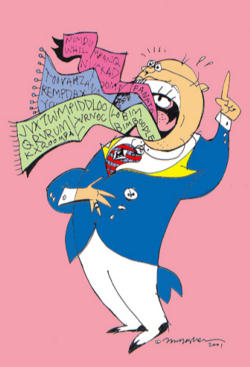
Some clever MIT students had their paper — “Rooter: A Methodology for the Typical Unification of Access Points and Redundancy” — accepted for presentation at an academic conference. The paper was generated by a computer program they wrote that generates meaningless but grammatically correct papers. Another blow for academic standards. CNN has the story.










Yes and no. For one thing, it was a conference, not a journal (and apparently a fairly commercially-orientated, poorly-regarded one at that).
Plenty of conferences, especially in the humanities and social sciences have a fairly open door policy anyway. Pretty much anyone connected with a University can turn up and give a paper, and they’re either not reviewed beforehand, or just the abstract is reviewed (minimally).
This isn’t necessarily a bad thing. These are conferences where hundreds of papers are given, most at the same time as many others (but in different rooms, of course). It isn’t practical to review them all. Rather, people turn up to what they think looks interesting. Some can be very bad, but you get more of a range of views.
In a way, this fits better with the Hayekian views often expressed by libertarians — although most academics would probably prefer to see some quality control in most cases.
So while this does tell people outside Universities something about some of the things that go in inside, it isn’t anything like the Sokal hoax. But interesting all the same.
Well said, Scott. In general, all that it takes to present a paper at a conference is a paper; the review of the paper takes place after it is accepted (this is true in economics, at least).
And at the conference, if the paper is nonsense the discussant will usually talk about something else, and the paper goes nowhere.
This is quite different from the peer review that occurs before a paper gets into a journal. This has a different set of problems. Good papers can be screened out and bad ones published, but for different reasons — Pete Boettke and Leland Yeager have written some interesting papers on this.
The “Rooter” paper was amusing. The authors ought to write an academic paper about their experience.
I agree, the Rooter paper was hilarious.
Even a cursory examination of just the title and the abstract of that paper should have clued somebody off.
If Mr. Steele could provide any cites to the Boettke and Yeager papers, it would be much appreciated.
Ross: I will do so, but I won’t get to it for a few days. Meantime, you might possibly find references for Boettke’s stuff on his website (at George Mason Econ Dept.)
Yeager citation:
Journal of Economic Perspectives, vol. 11 no. 4 (Fall 1997) pp. 153-165, “Austrian economics, neoclassicism, and the market test.”
I will try to find the Boettke reference, but am not certain it was published. Yeager has a ref. to some writing of Boettke&Prychitko that may be relevant.
I don’t have a reference for Boettke — his observations on peer review & publishing may have been in a paper on a different subject.